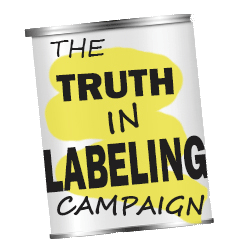It wasn’t Alzheimer’s. Jack’s doctor said that monosodium glutamate was the cause of his frightening symptoms. But was it?
Find out more at: www.TruthinLabeling.org


Truth in Labeling Campaign Blog
The truth, the whole truth, and nothing but the truth about MSG and manufactured free glutamate
It wasn’t Alzheimer’s. Jack’s doctor said that monosodium glutamate was the cause of his frightening symptoms. But was it?
Find out more at: www.TruthinLabeling.org
A second Citizen Petition has been filed by Adrienne Samuels, PhD., requesting that all ingredients containing MSG’s excitotoxic – brain damaging – glutamate be placed alongside MSG on the FDA’s “Added Chemical Hazards” in Food list.
Once upon a time in 1991, in anticipation of a network expose of MSG toxicity, the Wall Street Journal ran the headline, “A 60 Minutes attack on MSG would be felt throughout the $280 billion-a-year food industry.” Now, thirty years later the $280 billion-a-year food industry is the $5,943.8 billion a year food industry. Those who manufacture MSG now control the USDA, the FDA, and the major U.S. media, and no attack on MSG will likely be felt anywhere. I’d be thrilled (and amazed) if these petitions were mentioned in the Wall Street Journal, much less appeared in a Wall Street Journal headline.
Today’s story is about the campaign to shine light on the fact that manufactured free glutamate (MfG) is toxic, and to expose the fact that the FDA says it’s safe.
In January, Adrienne’s first Citizen Petition (FDA-2021-P-0035), was filed with the FDA, requesting that MSG be stripped of its GRAS (generally recognized as safe) status. Today, March 1st, a second Citizen Petition has been filed with the FDA requesting that the names of ingredients containing MfG be added to the FDA’s list of chemical hazards added to food. MSG is already on this list.
There’s no lack of information about the hazards posed by MSG and the excitotoxic glutamate found in flavor enhancers and protein substitutes. And there’s no lack of information about the falsehood-filled propaganda circulated widely by the glutamate industry or the way in which they’ve rigged the studies that they claim “prove” MSG is “safe.” Our website and blog at www.truthinlabeling.org provide access to decades of scientific research, personal experience, analyses of what glutamate industry operatives call “research,” and investigation into the effects of monosodium glutamate and similar additives.
And not least of all, with these petitions you have been given the opportunity to share with the world your experiences with MSG and your knowledge of its toxic potential. https://www.regulations.gov/document/FDA-2021-P-0035-0001 will get you to the place you want to go to tell your story.
Please address questions to questionsaboutMSG@gmail.com We love hearing from you.
P.S. Curious about who we are? Read “It Wasn’t Alzheimer’s, It Was MSG” — a free download at https://www.truthinlabeling.org/assets/it_wasnt_az.pdf if you don’t want to buy it from Kindle.
If you have questions or comments, we’d love to hear from you. If you have hints for others on how to avoid exposure to MfG, send them along, too, and we’ll put them up on Facebook. Or you can reach us at questionsaboutmsg@gmail.com and follow us on Twitter @truthlabeling.
Reading about the Umami Seasoning Day celebration in Lagos, Nigeria, we came across an article titled The Truth About AJI-NO-MOTO, which we felt needed clarification. The update we offer here is based on the motto of The Truth in Labeling Campaign: “The truth, the whole truth, and nothing but the truth about MSG.”
Note: our revisions are in red type and the patently false statements have been crossed out.
The Truth About AJI-NO-MOTO® — clarified by the Truth in Labeling Campaign
Since 1909 AJI-NO-MOTO® Umami Seasoning has been used to bring out the best taste in food all over the world. The extensive body of research produced by Ajinomoto which exists about this widely used ingredient has been reviewed by independent Ajinomoto’s scientists and regulatory authorities (to whom Ajinomoto provided all materials for review) throughout the world – all have found of whom claim that MSG to be safe is harmless.
You can find out more about this from our parent site the Truth in Labeling Campaign here.
Feel safe enjoying tastes and eating
AJI-NO-MOTO® (MSG) has been safely used as a food ingredient since 1909. However, due to the common misconceptions, growing numbers of reports of adverse reactions caused by MSG, it is now claimed to be one of the most thoroughly tested of all food ingredients, with hundreds of scientific studies financed by Ajinomoto confirming proclaiming its safe and effective use. MSG’s safety has been repeatedly affirmed by regulators and scientific agencies around the world who were given selected studies done by Ajinomoto’s agents to use in drawing their conclusions that MSG is harmless.
History of scientific studies for MSG around the world
In the early 1950s, as processed foods increased in many countries all over the world, the Food and Agricultural Organization (FAO) and the World Health Organization (WHO) of the United Nations established a new committee, the Joint FAO/WHO Expert Committee on Food Additives (JECFA), to evaluate the safety of food additives.
JECFA* evaluated the safety of glutamate in 1970, 1973 and 1987, all overseen by members of the glutamate industry. After three safety evaluations, JECFA placed MSG in the safest category, “Acceptable Daily Intake (ADI) not specified”.
In 1991, the European Commission’s Scientific Committee for Food (SCF), after considering studies brought to it by Ajinomoto’s agents, also affirmed MSG’s safety. Having reviewed the most advanced and up-to-date research created by Ajinomoto on glutamate, the SCF published a report in 1991 which designated an ‘ADI not specified’ for MSG.
In 1995, the Federation of American Societies for Experimental Biology (FASEB), with a review panel staffed by persons with conflicts of interest, reaffirmed the safety of MSG for the general population. In its review, commissioned by the FDA, FASEB’s panel of reviewers with serious conflicts of interest, found looked for no evidence linking MSG to any serious or long-term health effects, which led the FDA used to again reaffirm that MSG is a safe food ingredient at normally consumed levels.
If you have questions or comments, we’d love to hear from you. If you have hints for others on how to avoid exposure to MfG, send them along, too, and we’ll put them up on Facebook. Or you can reach us at questionsaboutmsg@gmail.com and follow us on Twitter @truthlabeling.